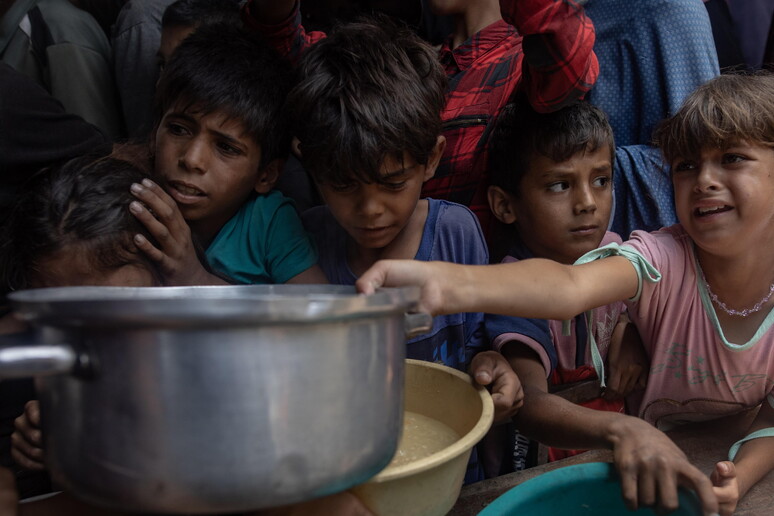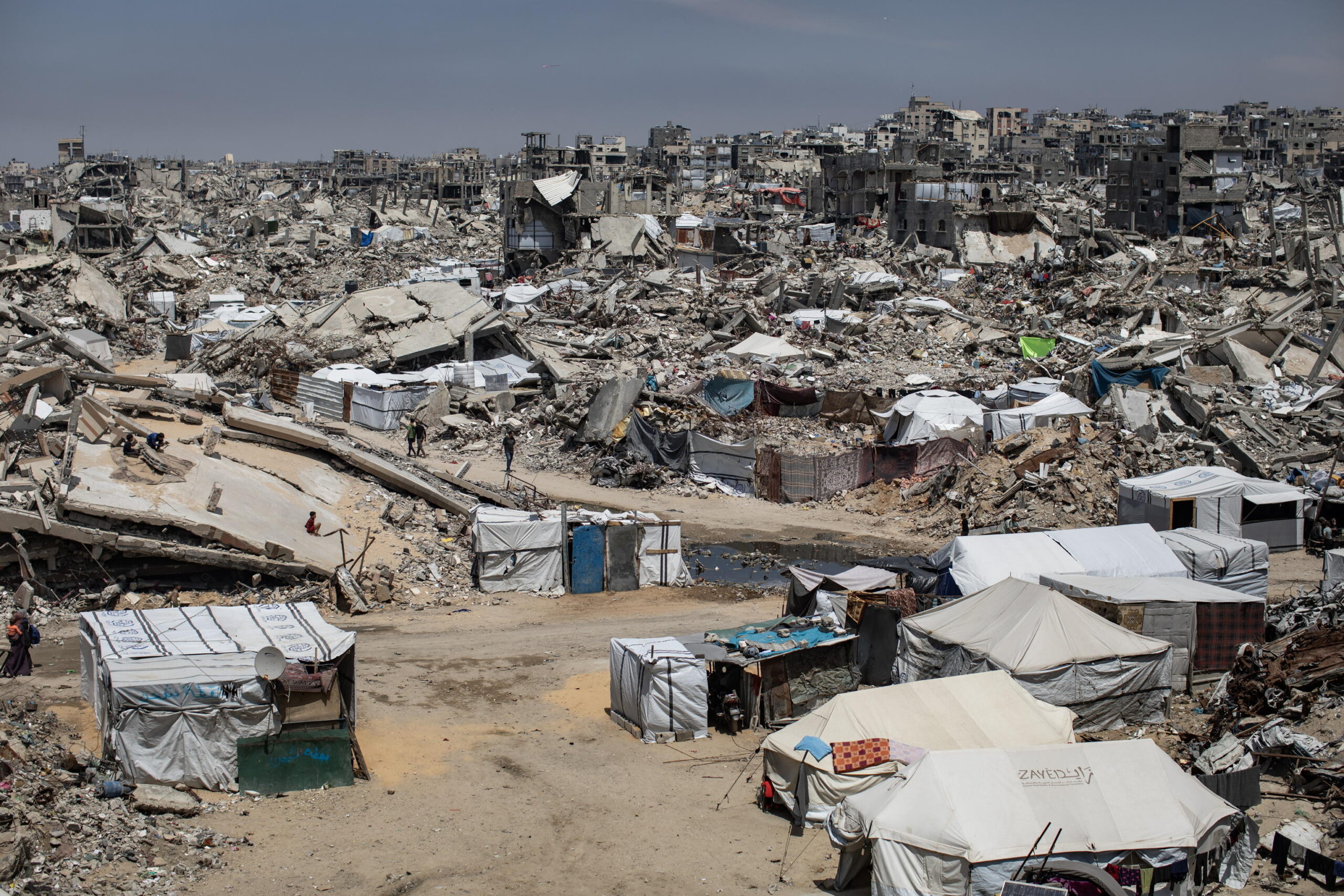A “neutral” foundation conceived within the upper echelons of Israel’s security apparatus has been given near-exclusive authority over humanitarian aid distribution in the Gaza Strip, where the United Nations says the Israeli government has long weaponized hunger as a tool of war.
The Gaza Humanitarian Foundation (GHF), launched with backing from both Tel Aviv and Washington, has just begun operating but is already facing strong international pushback. Introduced as a response to Israel’s prolonged blockade on Gaza, now entering its third month, the GHF says it will feed more than 1 million Palestinians. Humanitarian groups, however, call it a façade.
According to recent U.N. estimates, 93% of Gaza’s population is experiencing acute food insecurity, and one in three children is at risk of severe malnutrition. One in five residents is already facing starvation. Since March 2, when Israel shut down all aid crossings — a blockade only partially eased in recent days — the flow of essential goods has slowed to a trickle, including food, fuel, electricity, and medicine.
Israel has refused to reopen U.N.-coordinated humanitarian corridors. Instead, it has introduced a tightly controlled alternative: the GHF.
The initial plan, announced May 15, includes the establishment of several “secure distribution sites” in designated areas of Gaza to provide “a basic amount of food” to 1.2 million people. The foundation says it ultimately plans to serve the entire population. Security will be handled by private military contractors operating in coordination with the Israeli military.
But that structure is already drawing condemnation.
“The GHF restricts aid to only one part of Gaza while leaving other dire needs unmet,” U.N. humanitarian chief Tom Fletcher told the Security Council last week. “It makes aid conditional on political and military aims. It makes starvation a bargaining chip. It is a

cynical sideshow. A deliberate distraction. A fig leaf for further violence and displacement.”
The International Committee of the Red Cross expressed similar concerns. “We are concerned by the proposed aid mechanism for Gaza and are deeply worried that it will not allow for humanitarian aid to be distributed in a manner consistent with core humanitarian principles of impartiality, humanity, and independence. The ICRC cannot work under any mechanism that doesn’t allow us to uphold the principles and our modalities of work.”
Eleven humanitarian and human rights organizations signed a joint statement saying they “unequivocally reject the establishment” of the GHF, calling it:
“A project led by politically connected Western security and military figures, coordinated in tandem with the Israeli government, and launched while the people of Gaza remain under total siege. It lacks any Palestinian involvement in its design or implementation.”
That lack of local involvement, combined with the foundation’s reliance on Israeli military coordination and distribution inside a war zone, has led critics to label it a political tool masquerading as relief.
Reports also cast doubt on the foundation’s origins.
According to reporting by The New York Times, the Gaza Humanitarian Foundation was “an Israeli brainchild,” conceived in late 2023 during “private meetings of like-minded officials, military officers and business people with close ties to the Israeli government.”
Among those involved were Israeli-American venture capitalist Michael Eisenberg, as well as Yotam HaCohen and Liran Tancman — both affiliated with COGAT, the Israeli military body responsible for operations in the occupied territories. Before his government role, HaCohen previously served as a strategic adviser to the Israeli Ministry of Defense and later joined the staff of Brig. Gen. Roman Gofman, the prime minister’s military secretary. Tancman, a tech investor, has longstanding ties to defense-related ventures and Israeli military circles.
Later, the group brought in Philip F. Reilly — a former senior CIA official with a background in training Contra fighters in Nicaragua and later serving as the agency’s station chief in Kabul.
Reilly now leads the private security firm S.R.S., which began operating in Gaza in January during the temporary ceasefire, conducting weapons checks on Palestinian vehicles. Haaretz reported that S.R.S. entered the Strip without prior approval from Shin Bet, in what sources described as a process “entirely handled” by Brig. Gen. Roman Gofman, Netanyahu’s military secretary. The selection bypassed standard procedures and excluded both the IDF and the Ministry of Defense. Strategic Affairs Minister Ron Dermer, a close Netanyahu ally, was also closely involved, the paper said.
The project’s legal and financial framework remains murky. Though initially believed to be registered in Switzerland, the GHF is in fact registered in Delaware. Reilly registered both the GHF and S.R.S. in November 2024 through the same Chicago attorney, James H. Cundiff, of McDermott Will and Emery. The two entities even shared a spokeswoman until recently.

Wood said the foundation received a “small amount of seed money” from unnamed non-Israeli businessmen and claims that a Western European government has pledged over $100 million. He declined to name the country.
Adding to the confusion, at least two other organizations named Gaza Humanitarian Foundation exist — one registered in the U.S. and another in Switzerland. The Geneva-based GHF is now under scrutiny by TRIAL International, a Swiss NGO that has filed two legal submissions requesting government review to determine whether it meets international humanitarian standards.
Meanwhile, humanitarian workers say the GHF’s operational strategy is inadequate to address the scale of the crisis. Gaza currently has 400 aid distribution points, many of them staffed by experienced local NGOs and U.N.-accredited teams. The GHF plan calls for far fewer sites, primarily in southern and central Gaza. That has sparked fears of mass displacement.
“The Problem is Not Logistics,” the joint statement from the 11 humanitarian groups said. “It Is Intentional Starvation.”
The U.N. has warned that Palestinians in northern Gaza may be forced to move south simply to access food. Many roads are destroyed or inaccessible. Those who are wounded or disabled may be physically unable to reach the GHF’s planned hubs.
“Even if implemented, the plan’s proposed aid volumes fall short of the immense scale of needs in Gaza,” the ICRC said. “The level of need right now is overwhelming, and aid needs to be allowed to enter immediately and without impediment.”
The GHF will depend entirely on Israeli-controlled border crossings, primarily the Port of Ashdod and Kerem Shalom (Karem Abu Salem), for aid deliveries. “Despite branding itself as ‘independent’ and ‘transparent,’ the Gaza Humanitarian Foundation would be wholly dependent on Israeli coordination and operates via Israeli-controlled entry points,” the 11-group statement said.
Human Rights Watch’s Hanan Salah did not address the GHF directly, but said allowing only “a basic amount of food” into Gaza amounts to “complicity in using starvation as a method of warfare.”
Israel maintains that oversight is necessary to prevent Hamas from diverting aid, and accuses humanitarian organizations of being infiltrated by terrorist elements. Aid groups reject those claims, saying the U.N. closely monitors distribution and that diversions are minimal.
The current conflict began on Oct. 7, 2023, when Hamas-led militants attacked southern Israel, killing 1,200 people and taking 251 hostages. According to the Hamas-run health ministry, more than 53,000 people in Gaza have been killed or are presumed dead since the fighting began, though the figures do not distinguish between civilians and combatants. Israel says it has killed approximately 20,000 Hamas fighters inside Gaza and another 1,600 attackers during the October 7 assault.












